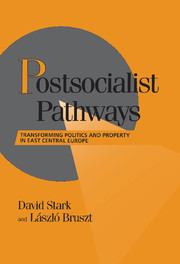Chapter 1 - Remaking the Political Field: Strategic Interactions and Contingent Choices
from Part I - Extrication
Summary
AN INTERACTIONIST MODEL FOR THE STUDY OF EXTRICATION
The cataclysmic dissolution of the Communist regimes and the clamorous awakening of the East European peoples in 1989 prompted observers to overestimate the strength of organized democratic forces in these events. The stunning electoral victory of Poland's Solidarity in June, the public drama of Imre Nagy's reburial in Budapest that same month, the street demonstrations in Leipzig in October, and the massive assemblies in Prague in November were all signs of popular strivings for democracy. But many observers mistook the enthusiastic expression of these aspirations as evidence of far-reaching democratic organization and misinterpreted the first stage of transition as being the already-achieved triumph of citizenship and civic values.
This overestimation of the strength of democratic forces in 1989 was a direct consequence of an overestimation, by many observers, of the strength of Communist party-states in the previous epoch. If only months earlier the “totalitarian” regimes of the region were cast as powerful, stable, and immutable, their sudden demise could be explained only by equally powerful forces organized for democracy. Behind the metaphors of volcanic eruptions of democracy and popular revolutions sweeping aside powerful tyrants was the idea that strong states could be toppled only by strong societies.
The contrary view contains its own share of misunderstandings but is probably closer to reality: Rather than strong states confronting strong societies, the more typical cases in Eastern Europe in 1989 were those in which weak states faced weak societies. Instead of powerful party-states, this view sees cumbersome but weak bureaucracies, ineffective in achieving the goals of economic growth and social integration, headed by demoralized leaders whose belief in their own ideologies had withered apace with the exhaustion of their political and economic programs. From such a perspective, it is no longer necessary to invoke a “democratically organized society” as the agent that “overthrows” the old order. Of course, the citizenry of Eastern Europe did act in 1989- But, with the exception of Poland, these were extraordinarily weak civil societies without organizations strongly rooted in their citizenry, without leaders experienced in national politics, without elaborated economic and social programs, and without deeply engrained traditions of democratic habits and practices.
- Type
- Chapter
- Information
- Postsocialist Pathways , pp. 15 - 48Publisher: Cambridge University PressPrint publication year: 1998



